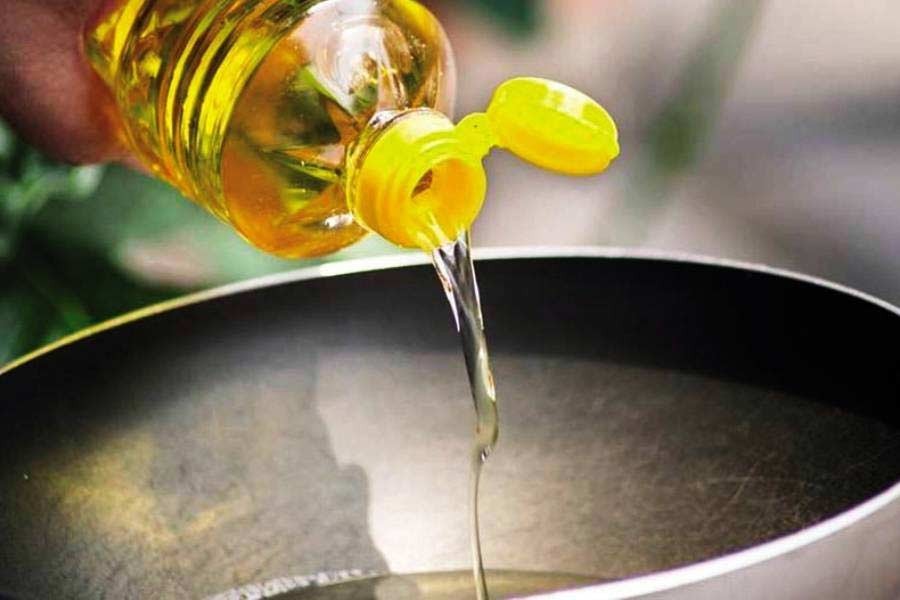Edible oil market became unstable further last week with a myriad of reasons, including supply crunch in the local market, price hike in international market and devaluation of Taka against US dollar are blamed for the volatility by both retailers and wholesalers.
Visiting various city markets on Thursday, this correspondent found scarcity of bottled or packed soybean and other oils of different brands at the retails and groceries a few days before of Eid-ul-Fitre when the commodity is used mostly for cooking.
Loose soybean oil hit Tk 186 per litre at the retails on the day, over 18 per cent hike in seven days, battering the consumers further who had a hole cut already in their pockets to meet rising cost of living triggered by price hike of other essentials.
Some groceries were seen having a few soybean oil bottles containing 5 litres of the oil and selling those to customers at Tk 800-820 a bottle against an MRP of Tk 760 written on them.
A notable number of groceries' shelves, allotted for the bottled cooking oil was found empty on Thursday, only 3-4 days ahead of the Eid.
Retailers said loose soybean oil price increased to Tk 184-186 per litre (Tk 200-205 a kg) and palm oil to Tk 170-175 a litre (Tk 185-190 a kg) in the city markets and elsewhere in the country in one week.
According to the Trading Corporation of Bangladesh (TCB), edible oils witnessed 15-18 per cent hike in the past seven days. Grocers said companies squeezed supply significantly in recent weeks which created a shortage in the market before the festival.
Currently, soybean oil is sold 30 per cent and palm oil 26 per cent above the government fixed rate in the local market.
Supply of bottled soybean oil or those packed in polythene containers were much lower than the demand as a notable number of retailers had almost run out of their stocks in the week putting the city dwellers in great difficulties at the fag end of Ramadan, it was found.
Gafur Sarker, a grocer at Mukti Cinema Hall area in city's Rayer Bazar area said distributors almost stopped supplying both bottled and loose oils despite repeating requests made by them in the last several days.
He said scarcity pushed up prices of both loose and bottled edible oil.
A few shops had bottles containing one and two litres of the oil on Thursday but consumers had to pay an additional amount of Tk 5.0-10 for each bottle, he said.
"I had a few one-litre bottles of soybean oil which I sold at Tk 165-170 a litre on Wednesday," he informed.
He said no shop had any five-litre soybean oil bottle on their shelves yesterday.
Juel Rana, another grocer at the city's West Dhanmondi, said, "I ordered one and two-litre bottles for Eid sale three weeks back to nearby distributors but they were yet to supply the commodity.
He said the market became volatile again like that of February last when many vendors started pouring the oil packed in 5-litre jars into their drums containing loose oil.
A trader at the city's wholesale market, Moulvibazar, said supply of loose oil has almost come to an end.
He said the DOs (delivery orders), issued recently by the refiners had already exchanged four to five hands thus making the oil costlier.
An official of a refining company said import has been shrunk as global price of soybean hit above $ 2,000 a tonne (excluding freight charge) which further increased the cost.
He said devaluation of BDT has came as another blow as one US dollar unofficially is now trading at more than Tk 93 which was maximum Tk 87 during many refiners' last import consignment period.
Before sitting at a meeting with the government freshly over the oil price, refiners were not eager to supply oil at large scale, he cautioned.
Consumers Association of Bangladesh (CAB) vice-president SM Nazer Hossain said: "As we have been informed by the government, there is no scarcity of edible oil as above 2.2 million tonnes of the commodity was imported while another 0.5 million was extracted locally," he mentioned.
He said the government should strictly handle the issue to force the refiners to sell edible oil at the fixed rates which was approved on March 19 last after the government cut VATs and a few other taxes on the import.
He urged the government for taking a comprehensive action plan immediately to ensure smooth supply of import-dependent commodities like edible oil, sugar, wheat and others items at affordable prices following gradual surge in their prices globally.
The country had a demand for 2.2 to 2.4 tonnes of edible oils in 2021 while it had availability of slightly over 2.7 million tonnes of the oil that year, according to government data.
It imports 2.2 million tonnes of palm oil, soybean oil and mustard oil while gets another 0.4 million tonnes of soybean oil by crushing seeds locally. The country also produced above 0.1 million tonnes of mustard oil locally.
Meanwhile, sugar price increased to Tk 85-95 marking Tk 5.0 a kg further, according to groceries.
Broiler, Pakistani, indigenous chickens witnessed Tk 15-30 a kg hike in a week.
Loose maida price reached a record Tk 58 a kg while branded one Tk 65 a kg witnessing Tk 5.0-6.0 a kg hike.
Aromatic rice including chinigura and kalijeera increased to maximum Tk 140 a kg-Tk 10 a kg hike in a week and Tk 20 a kg in last one month.
Loose aromatic rice of same varieties' prices rose to Tk 120-125 a kg marking another Tk 10 a kg hike before Eid.


